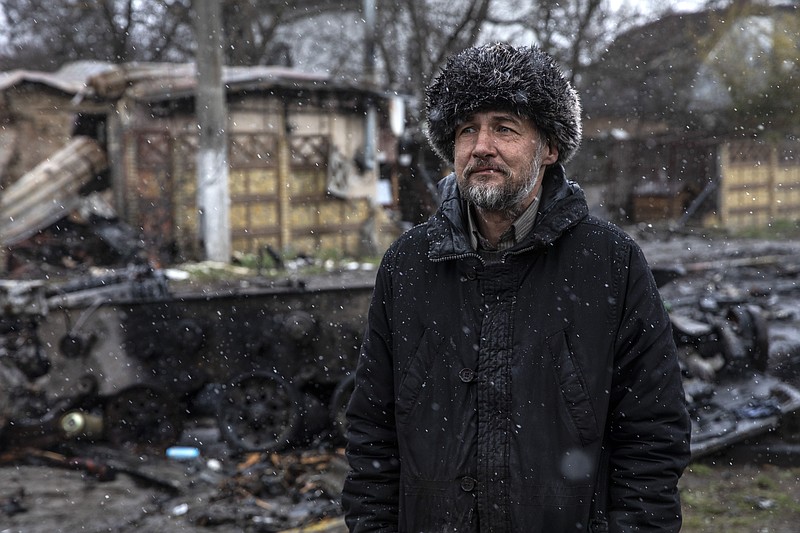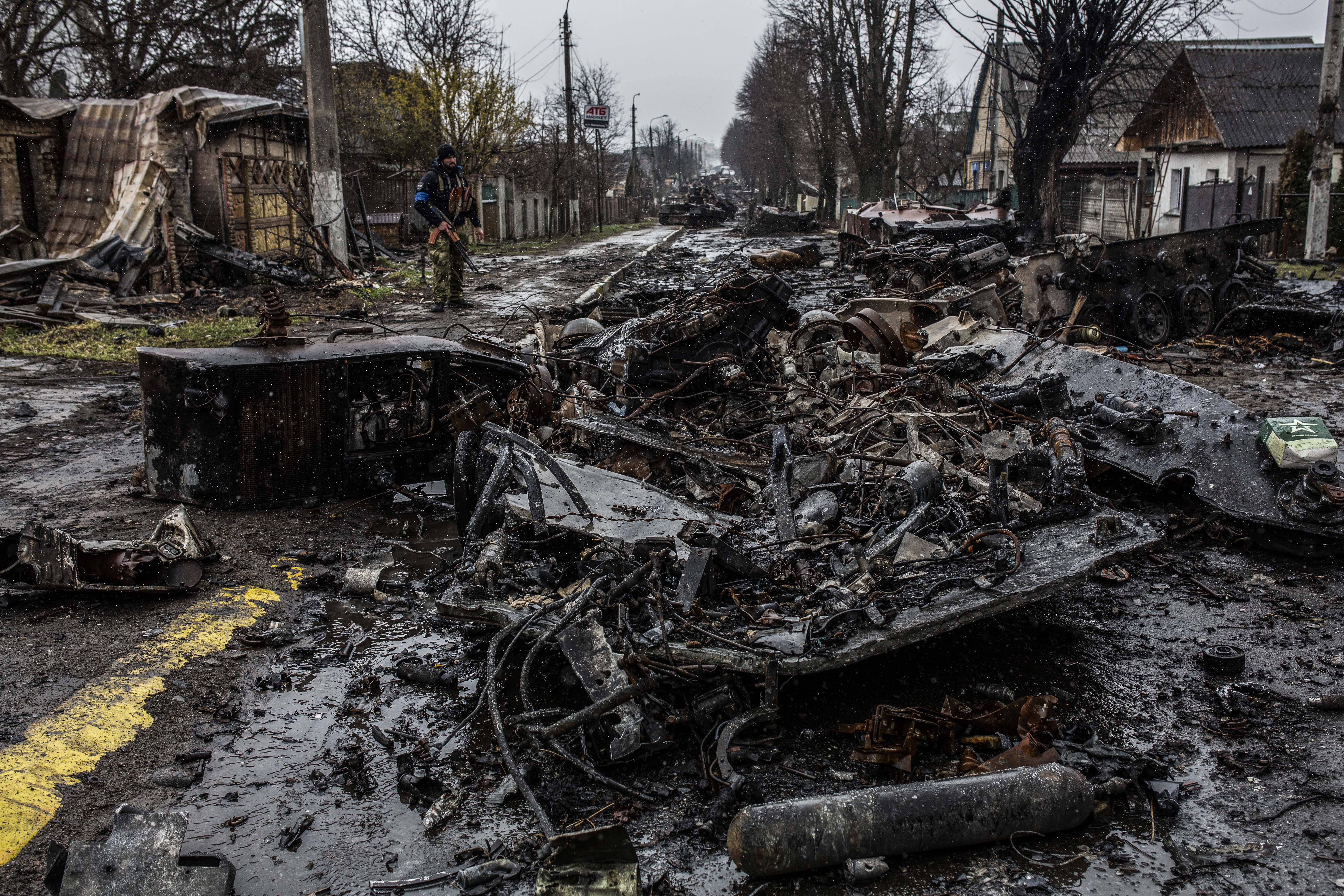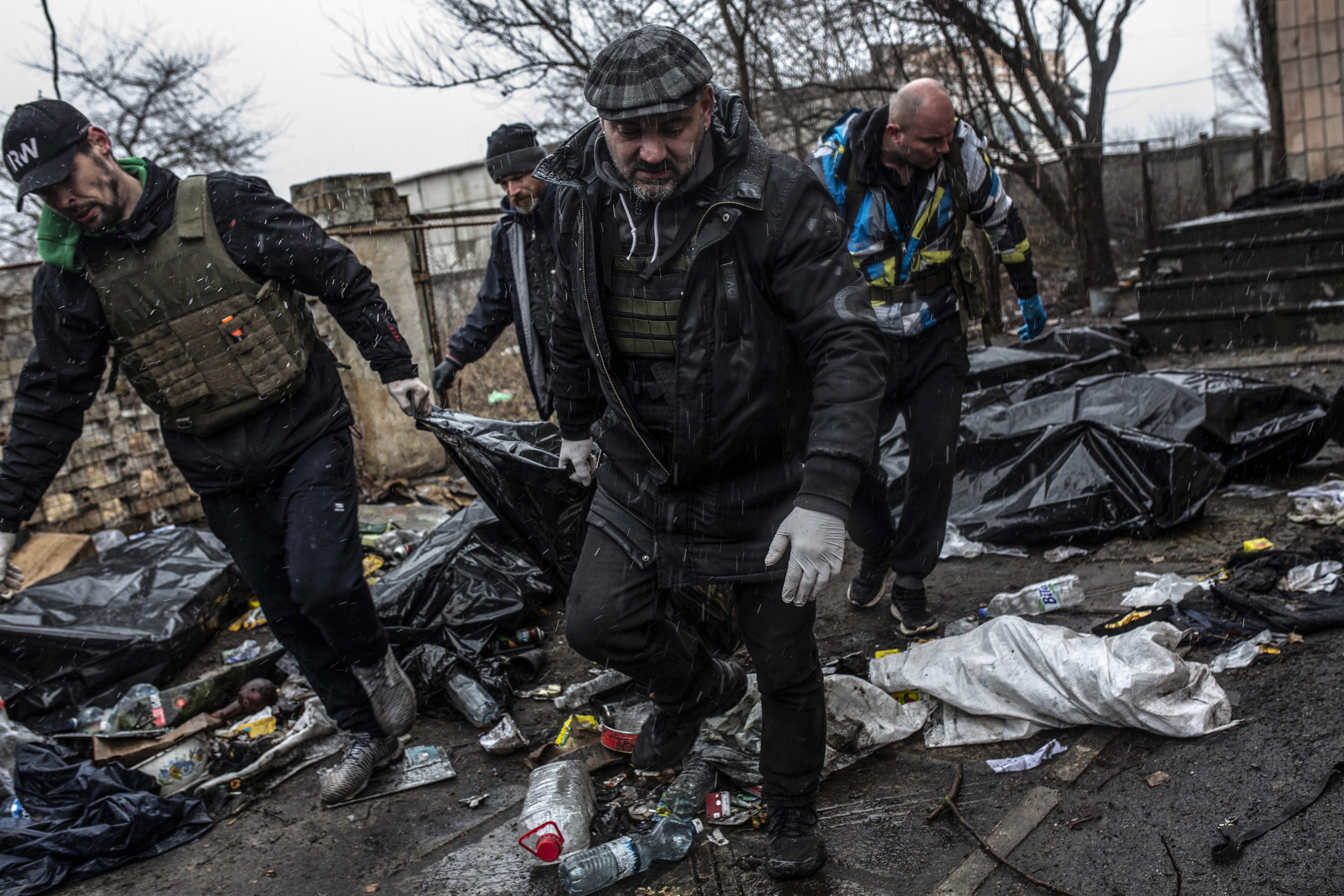Moscow faced global revulsion and accusations of war crimes Monday after the Russian pullout from the outskirts of Kyiv revealed streets and yards strewn with corpses of what appeared to be civilians, some of whom had seemingly been killed at close range.
The images of battered bodies left out in the open or hastily buried led to calls for tougher sanctions against the Kremlin, including a cutoff of fuel imports from Russia. Germany and France reacted by expelling dozens of Russian diplomats, suggesting they were spies.
Ukrainian President Volodymyr Zelenskyy left the capital, Kyiv, for his first reported trip since the war began nearly six weeks ago to see for himself what he called the "genocide" and "war crimes" in Bucha. He said dead people had been "found in barrels, basements, strangled, tortured."
Later, in a video address to the Romanian parliament, Zelenskyy said he fears there are places where even worse atrocities have happened.
"The military tortured people, and we have every reason to believe that there are many more people killed," he said. "Much more than we know now."
Zelenskyy is scheduled to address the U.N. Security Council for the first time at a meeting today that is certain to focus on Bucha.
The Ukrainian prosecutor-general's office described one room discovered in the town as a "torture chamber." In a statement, it said the bodies of five men with their hands bound were found in the basement of a children's sanatorium where civilians were tortured and killed.
The dead included bodies wrapped in black plastic, piled on one end of a mass grave in a Bucha churchyard. Many of those victims had been shot in cars or killed in explosions trying to flee the city. With the morgue full and the cemetery impossible to reach, the churchyard was the only place to keep the dead, Father Andrii Galavin said.
Tanya Nedashkivs'ka said she buried her husband in a garden outside their apartment building after he was detained by Russian troops and was found dead with two others in a stairwell.
"Please, I am begging you, do something!" she said. "It's me talking, a Ukrainian woman, a Ukrainian woman, a mother of two kids and one grandchild. For all the wives and mothers, make peace on Earth so no one ever grieves again."
Another Bucha resident, Volodymyr Pilhutskyi, said his neighbor Pavlo Vlasenko was taken away by Russian soldiers because the military-style pants he was wearing and the uniforms that Vlasenko said belonged to his security guard son appeared suspicious. When Vlasenko's body was later found, it had burn marks from a flamethrower, his neighbor said.
"I came closer and saw that his body was burnt," Pilhutskyi said. "They didn't just shoot him. They also used that weapon which sends out fire."
RUSSIAN DENIALS
As the world expressed anger over mounting evidence that Russian troops slaughtered civilians in Bucha, officials in Moscow denied Russian involvement and dismissed images of dead bodies as fraudulent.
Russian diplomats and pro-Kremlin accounts on Monday amplified that view on social media, going so far as to suggest that corpses in video footage were actors participating in a hoax to discredit Russia. State-controlled news programs, meanwhile, either ignored the reported atrocities or echoed the official line.
Some liberal Russian voices expressed grief over the reports and photos emerging from Bucha, where the local mayor, Anatoly Fedoruk, has said about 270 residents had been buried in two mass graves.
"Each of us has a personal responsibility for what is happening," Dmitry Aleshkovskiy, founder of a charitable group called Help Needed, wrote in a Facebook post about Bucha. "Some have more, some have less. I have it. And so do you, reader."
But reaction from the Kremlin and its supporters grew more defensive as officials accused Kyiv and Western allies of staging the atrocities.
"The other day, another fake attack was launched in the city of Bucha," Foreign Minister Sergei Lavrov said in televised remarks Monday. "After the Russian military personnel left from there in accordance with plans and agreements, a few days later they staged this fake, which is being dispersed through all channels and social networks by Ukrainian representatives and their Western patrons."
Konstantin Kosachev, deputy speaker of the upper house of Russia's parliament, said there was "no doubt whatsoever that it was staged."
"The fact that the Kyiv authorities organized it and are now hyping it up is a crime. And the fact that the West picks up this fabrication and adds maximum resonance to it, makes the West an accomplice of this cynical and immoral crime," he said.
Some Russians said they didn't think it was possible the killings could have been carried out by their military.
"I saw the video footage yesterday. It is so awful, I can't believe it, I refuse to believe it. Russians could not have possibly done it," said a 52-year-old engineer in Moscow who would give only his first name, Igor. He added, "I understand there might be civilian victims in any war. But what I saw in the video from Bucha is beyond any common sense. I don't know who did it. If this is not fake, my brain refuses to accept it."
That type of response is common these days among Russians, said Anton Shirikov, a graduate student at the University of Wisconsin at Madison who studies Russian state propaganda. The Kremlin's misinformation "might not work in the sense that people believe everything, but people who are on the side of the government think that some of it must be true," he said. Or they think, "We, the Russian army, cannot be that bad, so the other side must be bad."
Kremlin spokesman Dmitry Peskov on Monday also dismissed video footage emerging from Bucha as fake.
"From what we have seen -- the video materials -- in many ways they cannot be trusted, because our specialists from the Ministry of Defense have revealed signs of video fraud and various fakes," Peskov told journalists during a briefing.
Russia's Defense Ministry labeled the reports of alleged atrocities a "provocation," saying that while Russian forces controlled Bucha "not a single local resident suffered from any violent actions."
In a post on Twitter, Alexander Alimov, a Russian diplomat at the United Nations in Geneva, said video footage from Bucha was fake because the bodies on the street appeared to be alive and moving.
EUROPE DIVIDED
German Foreign Minister Annalena Baerbock said the images from Bucha reveal the "unbelievable brutality of the Russian leadership and those who follow its propaganda." And French President Emmanuel Macron said there is "clear evidence of war crimes" in Bucha that demand new punitive measures.
"I'm in favor of a new round of sanctions and in particular on coal and gasoline. We need to act," he said on France-Inter radio.
Though united in anger, the European allies appeared split on how to respond. While Poland urged Europe to quickly wean itself off Russian energy, Germany said it would stick with a gradual approach of phasing out coal and oil imports over the next several months.
The U.S. and its allies have sought to punish Russia for the invasion by imposing sweeping sanctions but fear further harm to the global economy, which is still recovering from the pandemic. Europe is in a particular bind, since it gets 40% of its gas and 25% of its oil from Russia.
Poland's prime minister, Mateusz Morawiecki, described Russia under Putin as a "totalitarian-fascist state" and called for strong actions "that will finally break Putin's war machine."
"Would you negotiate with Hitler, with Stalin, with Pol Pot?" Morawiecki asked of Macron.
MARIUPOL EVACUATIONS
In another development Monday, more than 1,500 civilians were evacuated from the besieged and devastated port city of Mariupol in the south, using the dwindling number of private vehicles available to get out, Ukrainian Deputy Prime Minister Iryna Vereshchuk said.
But amid the fighting, a Red Cross-accompanied convoy of buses that has been thwarted for days in a bid to deliver supplies and evacuate residents was again unable to get inside the city, Vereshchuk said.
European leaders and the United Nations human-rights chief joined the Ukrainians in condemning the bloodshed that was exposed after Russian troops withdrew from the capital area.
At the same time, many warned that the full extent of the horrors has yet to emerge.
"I can tell you without exaggeration but with great sorrow that the situation in Mariupol is much worse compared to what we've seen in Bucha and other cities, towns, and villages nearby Kyiv," Ukrainian Foreign Minister Dmytro Kuleba said.
HOSPITAL SHELLED
Elsewhere in Ukraine, mothers with newborn babies, a woman with a heart condition and elderly people who couldn't walk on their own were hurriedly evacuated to the basement at a hospital in Mykolaiv late Sunday as the booming thuds of artillery drew closer.
They made it down to shelter just in time. Five minutes after patients and staff had crowded into the cramped underground hallway, a suspected cluster munition landed next to the building. The blast shattered nearly all of the windows.
It made for an eventful first night for Bohdan, who was born in the makeshift bomb shelter after his mother, Vitalina, and others from the maternity ward made the most harrowing journey to safety, from the hospital's top floor.
"The Russians are animals; there's no other explanation," said Bohdan's grandmother Vlada. The family declined to provide their surnames out of concerns for their safety.
Vlada cried as she hugged her daughter and met Bohdan for the first time. He was sleeping with a pacifier in his mouth. Three other women and their babies were sitting on cots in the small room in the basement.
Hospitals in Ukraine are being battered by artillery and airstrikes with increasing frequency. The World Health Organization said that as of March 30, it had verified 82 incidents of attacks on health care facilities since Russia invaded Ukraine, causing 72 deaths and 43 injuries.
At Mykolaiv's City Hospital No. 5, no one was injured in the attack. As nurses and volunteers moved from one ward to the next sweeping up broken glass, their feelings ranged from distress to anger. One staff member cried as she opened the door to what used to be her laboratory. The window glass was gone. The glass in the cabinets was shattered, too.
"Gosh, can this end already?" said Lyubov Byaluk, a nurse. "What did we even do? We never attacked anyone."
The heavy shelling throughout Mykolaiv on Sunday -- which killed 10 people and injured 46, according to Mykolaiv Mayor Oleksandr Senkevych -- comes as the war with Russia could be shifting more toward eastern and southern Ukraine. Moscow has pulled back its forces from areas north of Kyiv, but its military has continued heavy fighting in the eastern Donbas region and along the front line east of Mykolaiv.
ROAD TO U.S.?
In another development, a group of undocumented migrants believed to be from Russia and other Eastern European countries arrived by boat on Sunday in Key West, Fla., raising concerns that the war in Ukraine is spurring refugees and others to seek dangerous new routes to the United States.
Alyson Crean, a spokeswoman for the Key West Police Department, said a boat chartered from Cuba docked at the south end of Duval Street, in the heart of the city's tourist district, about 4 p.m. Sunday. Crean said Key West police were called after about 15 of the migrants, whom she identified as being from Russia or other countries from Eastern Europe, walked into Southernmost Beach Cafe.
After arriving on the scene, Key West police requested assistance from the Department of Homeland Security, including its sub-agency, U.S. Customs and Border Protection. The Department of Homeland Security did not immediately respond to questions about how many migrants landed and whether all were screened or taken into custody.
"This is something different and new," said Monroe County Mayor David Rice, adding that officials initially treated the landing as a "national security event."
"All we ever do when we have migrants land of any nationality is to make sure they are safe, but these people were not like the usual migrants," Rice said. "They were well-dressed, on a chartered boat, and hadn't been adrift for a week."
Monroe County Sheriff Rick Ramsay said the migrants, many carrying luggage, arrived on a 30-foot vessel. He cautioned it was premature to view this incident as a possible broader trend in migration patterns. Local authorities did not know if the group had recently fled the war or had been in Cuba for some time.
Ukrainian war refugees and their families in the United States are growing increasingly frustrated with efforts to bring their relatives into this country.
On Saturday, The Washington Post reported that hundreds of refugees from Ukraine were gathered at the U.S. border in Tijuana, Mexico, joining refugees from around the globe.
Information for this article was contributed by Jeanne Whalen, Robyn Dixon, Isabelle Khurshudyan, Tim Craig, Maria Sacchetti, Jennifer Hassanand Mary Ilyushina of The Washington Post; and by Lolita Baldor, Oleksandr Stashevskyiand Nebi Qena of The Associated Press.


